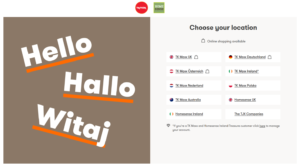European retail expansion architecture strategy review for an "out of season/end of lines" fashion brands re-merchandiser
The Situation
He was an associate consultant for CVL Retail Management Consultants, and led a small team of consultants to undertake an assignment to review and add to IT/IS architecture strategy.
The client was TK Maxx, a European retailer of “out of season/end of lines” fashion merchandise brands who was expanding into other countries than UK and USA.
After establishing a strong presence in the UK, TK Maxx (part of the TJX Companies Inc.) wanted to expand into continental Europe. Germany and Poland were strategic choices due to their large and growing consumer markets, and the opportunity to replicate their off-price retail model in these new geographies.
Their IT Director wanted additional perspectives from external retail and supply chain SMEs to assist in board level commercial strategy plans from a technology requirements and architecture response to business strategy.
The Task
The consulting task was to assist in building the IT/IS business case for necessary technology infrastructure change to support TK Maxx expansion, specifically Germany and Poland, following their successful growth in the UK.
This required considering the complexities associated with taxonomies, varying fiscal rules across countries, and the general challenges of operating in foreign cultures and European regulations.
Moreover, the technological needs both in terms of infrastructure as well as application architecture were to be assessed and the the case for change developed. This expansion needed to align to corporate strategy ensuring technology considerations were aligned with TK Maxx’s broader European expansion strategy.
The Action / Approach
The key consulting actions included:
- Technology Needs Assessment:
- Conducted an assessment to identify the critical technology requirements for TK Maxx’s European expansion.
- Identification and review of critical infrastructure gaps in TK Maxx’s existing systems that could hinder scaling across Europe.
- Understand and prioritise modular, adaptable systems that could be localised easily.
- Taxonomy Challenge Analysis: Analysed the complexities related to merchandise taxonomies in the context of multi-country operations. TK Maxx operates a unique treasure-hunt retail model, which makes classification of inventory a nuanced task. In a multi-country context:
- Product categories would need to be redefined or mapped to comply with local retail and tax regulations.
- Differences in product labelling standards, unit of measures, and category definitions across markets required careful harmonisation.
- Cross-border inventory visibility demanded a flexible taxonomy framework.
- Undertake a cross country review of merchandise classifications across the main focus of UK, Germany, and Poland with a view to any harmonisation while keeping a flexible taxonomy framework integrated into ERP systems.
- Fiscal Rule Consideration: Investigated and considered the diverse fiscal rules and regulations applicable in Germany and Poland.
-
- A mapping exercise for key tax compliance needs, including VAT reporting, invoice structuring, and audit trails.
- Review of localised configurations in financial modules.
- VAT Systems in Germany and Poland (for instance) each have distinct VAT structures and reporting requirements. This impacted:
- Point-of-sale systems, which needed to support localised tax calculations.
- Back-office processes, including invoicing, returns, and cross-border transfers.
- Accounting Standards: Each country operates under its own fiscal calendar and statutory accounting rules. These required:
- Adjustments in financial systems.
- Compliance reporting adaptations.
- Cultural Challenge Integration: Incorporated the general challenges of operating in foreign cultures into the technology considerations.
-
- Consider the change management processes that may need to be embedded to address internal cultural adaptation.
- Review what front-end design changes may be needed for local consumer preferences.
- Consumer Behaviour: Shopping habits and brand perceptions in Germany and Poland differ markedly from the UK. This influenced:
- Store layout and merchandising strategies.
- Marketing approaches, which had to be localised.
- Language and Communication: Internal systems (e.g., ERP, HR) had to support multi-language capabilities.
- Workforce Norms: Employment regulations, union involvement, and HR practices also varied by country.
- Case Development Support: Provided support and expertise in building the overall business case for the required technology infrastructure.
- Expansion Strategy Alignment: Ensured that the technology considerations were aligned with TK Maxx’s broader European expansion strategy.
The Result
The consulting contributions resulted in:
- Informed Technology Planning:
- The assignment provided insights and analysis to inform TK Maxx’s technology planning for their European expansion.
- This enabled leadership to make evidence-based technology investment decisions.
- Identification of Key Technology Considerations:
- Critical technology needs, taking into account taxonomies, fiscal rules, and cultural challenges, were identified up front and not dealt with as afterthoughts.
- Strengthened Expansion Case:
- The input supported the development of a robust case for the necessary technology investments to facilitate successful expansion into Germany and Poland.
- Mitigation of Potential Risks:
- By proactively considering complexities like fiscal rules and cultural differences, the work helped mitigate potential risks associated with international expansion.
- Foundation for Future Architecture:
- The assessment laid the groundwork for defining the specific IS architecture required to support TK Maxx’s European operations.


